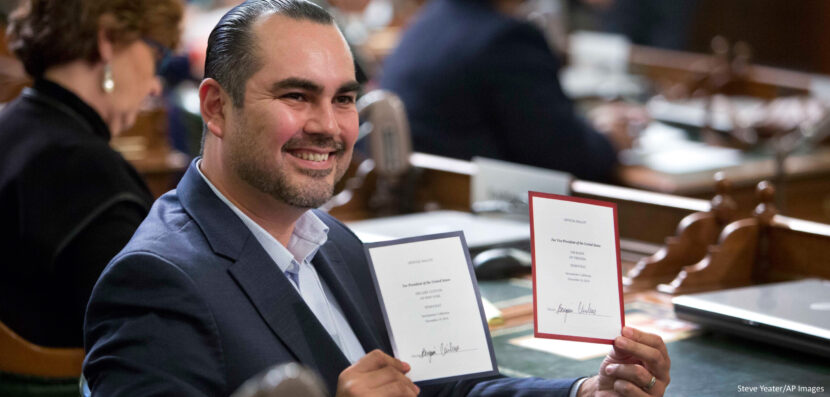- Current Events New Alabama Congressional District Selects Candidates
- Current Events Nebraska Rejects Winner-Take-All Proposal
- Citizenship Voting Under Age 18
- Citizenship Citizenship in Action
- Democratic Party Biden’s and Trump’s Recent Primary Results
- Elections Trump and Biden Win South Carolina and Michigan Primaries

Electoral College Secures Trump’s Victory
On Monday, the 538 members of the Electoral College met in capital cities across the nation to vote in favor of electing Donald Trump as the next president. A majority of 270 votes was required for Trump to win. He received 304 votes to Hillary Clinton’s 227, thus securing his victory.
However, Donald Trump lost the popular vote to Clinton by nearly 3 million ballots. Why, if Clinton won by such a large popular margin, is Trump still the president-elect? Here, a look at the history of the Electoral College and the role it played in the contentious 2016 presidential election.
An Early Compromise
The Electoral College was established in Article II of the Constitution. Some of the delegates to the Constitutional Convention wanted the president to be elected by a vote in Congress, while others wanted the president to be chosen by a popular vote: the Electoral College was formed as a compromise. It was seen as a way to protect small, less-populated states from being dominated by the more populous ones.
According to the Constitution, each state receives a number of electors equal to its number of senators (two per state) plus its representation in the House of Representatives (depends on population; currently ranging between one and 52 members). The 23rd Amendment also provides three additional electors to the District of Columbia. Anyone who is not a senator or a representative, or who does not hold government office, is eligible to be an elector.
Congress determines the date on which the Electoral College meets to decide the president. Currently, that date is the first Monday after the second Wednesday in December. Each candidate has his or her own group of electors, which are usually chosen by a candidate’s political party. Therefore, when you vote for a candidate, you are really voting for his or her electors. Most states have a “winner-take-all” system, meaning that whichever candidate wins a state receives all of that state’s electoral votes. After the electors have cast their ballots, the current Electoral College is dissolved and a new one is chosen for the next presidential election in four years.
Electoral College In the Spotlight
Usually, the Electoral College is a mostly ceremonial institution. This year, however, the electors found themselves in the spotlight as Democratic activists encouraged Republican electors to break party lines and vote against Trump. Despite Clinton’s sizable victory in the popular vote, 37 electors would have needed to “flip”–or change their vote from Republican to Democrat–in order to keep Trump from victory. Despite protests at many state capitals, by the end of the day on Monday, Trump had received 304 electoral votes, while Clinton received 227. Seven “faithless” electors voted for other candidates (ironically, five voted against Clinton rather than Trump). Though this number is historically significant–the largest number of faithless electors in over a century–it wasn’t enough to change the outcome of the election.
The Electoral College results will be officially certified January 6, during a joint session of Congress. This is the final step of the election process until the president’s inauguration on January 20, 2017.



